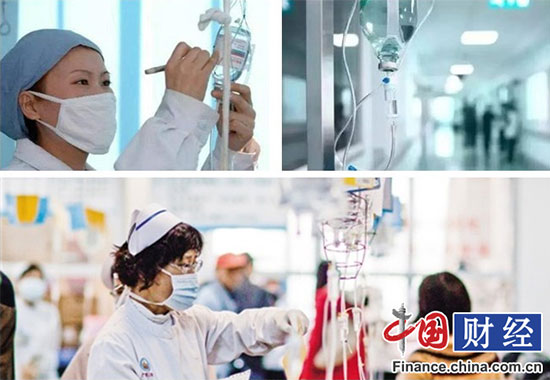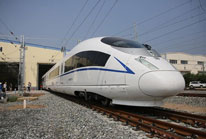


Intravenous infusions, believed to be one of the most dangerous ways of giving medicine to patients in the world, are popular in China, especially in rural areas. [File photo: finance.china.com.cn]
It's reported medical authorities in many Chinese provinces and cities have banned intravenous infusions by outpatient services at major hospitals.
Chinanews.com says Jiangsu became the first province in China to stop IV infusions at outpatient services in public hospitals for county and above levels on July 1, after similar moves by cities or hospitals in other provinces early in the year. On August 1, a provincial level ban was issued also in west China's Shanxi province.
Intravenous infusions, believed to be one of the most dangerous ways of giving medicine to patients in the world, are popular in China, especially in rural areas. The report cited data showing over 10 billion bottles of medicine were consumed through IV infusion in China in 2011. That's around 8 bottles per citizen, well over the world average of 2.5-3.3 bottles for each person every year.
The practice is frowned upon internationally as IV infusions can be dangerous and are regarded as minor surgery, according to Wang Yuhua from the health authority in Changzhi, Shanxi province. He adds that in general IV infusions are only carried out for patients in emergencies, and for those who cannot eat.
Its popularity in China, according to experts, is due to the lack of financial support given by the government to public hospitals, which then turn to prescribing more medicines and offering more checkups for patients in order to make money.
As there aren't many private or personal doctors, people in China, especially in rural areas have a habit of requesting IV infusions even when they are simply suffering from a cold. It's also reportedly popular for IV infusions to be used to help prevent disease during the change of seasons.
Experts believe the ban will help change the habits of seeking medical services too lightly, and the excessive use of antibiotics.
Industry insiders note that banning IV infusions at outpatient services is part of China's medical system reform. One of the focuses of reform is to improve the service level of public hospitals and cut their financial reliance on prescribing medicines to patients.
 World's fastest bullet train to start operating next month
World's fastest bullet train to start operating next month Huangluo: China's 'long hair village'
Huangluo: China's 'long hair village' Spectacular bridge with one of the tallest piers in the world
Spectacular bridge with one of the tallest piers in the world Magnificent view of Hukou Waterfall
Magnificent view of Hukou Waterfall A glimpse of Stride 2016 Zhurihe B military drill
A glimpse of Stride 2016 Zhurihe B military drill US Navy chief tours Liaoning aircraft carrier
US Navy chief tours Liaoning aircraft carrier Chinese American woman wins Miss Michigan
Chinese American woman wins Miss Michigan Centenarian couple takes first wedding photos
Centenarian couple takes first wedding photos Traditional Tibetan costumes presented during fashion show
Traditional Tibetan costumes presented during fashion show Top 10 livable Chinese cities
Top 10 livable Chinese cities Top 20 hottest women in the world in 2014
Top 20 hottest women in the world in 2014 Top 10 hardest languages to learn
Top 10 hardest languages to learn China’s Top 10 Unique Bridges, Highways and Roads
China’s Top 10 Unique Bridges, Highways and Roads Embassy attack must be properly handled
Embassy attack must be properly handled Hangzhou ready for a safe and secure G20 summit
Hangzhou ready for a safe and secure G20 summit
 Wealthy Chinese patients going abroad for latest drugs, better service
Wealthy Chinese patients going abroad for latest drugs, better service
 With changing views and fast-paced lifestyles, youth in China no longer think that marriage is a necessity
With changing views and fast-paced lifestyles, youth in China no longer think that marriage is a necessity
Day|Week